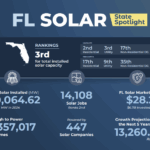Alabama has over 200 sunny days annually. This makes Alabama the 16th-rated state as far as sunshine in the US. Solar is still reasonably new in the state. Here are some of the incentives available to Alabama home and business owners.
Table of Contents
Federal Solar Investment Tax Credit (ITC)
Homeowners who qualify for the Solar ITC can take advantage of a tax credit of 30% of the cost of their solar energy system. This can add up to huge savings for solar owners. The Federal ITC is set to expire in 2035, so act now to take advantage of these solar savings while you can!
Net Energy Metering (NEM)
NET metering in Alabama is a billing arrangement for solar panel owners that credits them for the excess electricity they generate. When your solar panels produce more energy than your home consumes, the surplus is fed back into the grid and credited to your account, effectively spinning your meter backward.
These credits can offset future electricity consumption, resulting in lower energy bills. Net metering promotes the efficient use of solar power, reduces reliance on fossil fuels, and supports the transition to clean energy. By participating in net metering, you save money and contribute to a more sustainable energy future while helping maintain grid stability in Alabama.
While not mandated by the Alabama Public Service Commission, utilities like Alabama Power and the Tennessee Valley Authority offer net energy metering or similar programs.
Property Tax Exemptions for Solar:
Alabama offers a property tax exemption for renewable energy systems, including solar installations. This exemption means that the added value of your solar panels will not increase your property taxes.
Utility Rebates:
For solar systems, customers will receive a premium rate of $0.12/kWh on top of the standard retail rate. All other renewable energies are offered at $0.03/kWh plus retail rates (small hydropower, biomass, and wind energy systems). New subscribers will receive a $1,000 bonus for joining that can be put toward the installation costs of a given system.
Further information and programs can be found at the https://programs.dsireusa.org/system/program


